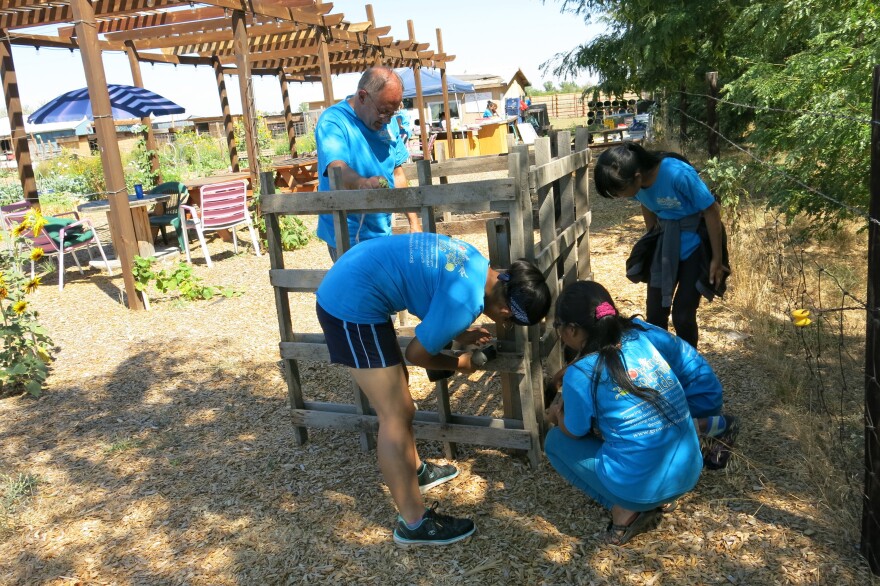Two years ago, PawHser Moo's mother started pushing her and her sisters to join a group called Growing Colorado Kids. As Moo recalls, at first, she was far from thrilled by the idea.
"I was like, 'Oh my gosh, no! I have to wake up early!' " says Moo — a pretty typical reaction for a 14 year old. Wake up early on Saturdays just to catch a van up to rural Adams County, about a half-hour drive from Denver, only to spend hours outside gardening? It was hardly her first choice for her weekends.
"I wanted to use my phone on Saturday and relax," says Moo. "But it's more worth it, spending time here."
For refugee families arriving in Colorado, like Moo's, the transition to life in America can be overwhelming. And most have to do it on a shoestring budget. Growing Colorado Kids is there to ease the transition. The nonprofit group helps refugee kids feed their families while also nourishing the kids' development.
Two years after Moo first set foot on the small farm near Brighton, the native of Myanmar is one of the group's paid youth leaders. She's now teaching other kids how to manage the massive vegetable beds and take care of the farm's chickens, bees, donkeys and the other livestock.
In return for their labor, the program's dozen kids get to take home most of the food the farm produces to their families' apartments in Denver and Aurora. Moo says she enjoys the fresh, tasty meals that result.
"It's also helped my parents because they're always busy and they don't have time to go to the grocery store," she says.
The food the kids produce saves their families time. It saves them money, too. All of the program's kids are refugees from countries like Myanmar, Somalia and Ethiopia. And all of them qualify for free or reduced-price lunches at their schools. In the summer, when families have to supply all three meals a day, money can get really tight.

"We hear that all the time, how grateful they are to have that little extra bit of help," says Denise Lines, the group's founder and director.
Lines was working for a Denver-area refugee housing agency about a decade ago when she saw how hard it was for some families there to put healthful food on the table. At the same time, Lines wanted to do something to break through the isolation refugees often face in their new country. Gardening could meet both needs.
"Most of these families get moved into one square block, and so you're only seeing other people like you. You're not truly being — and I don't like the word 'integrated' — but you're not getting to know your neighbors," Lines says.
When Growing Colorado Kids started, the group cultivated gardens in the yards of Lines' neighbors in northeast Denver, sharing their produce with the homeowners. A few years in, Lines and her husband realized their dream of moving to a small-acreage farm outside of the city, near Brighton. And they brought the program with them.
On a recent day at the farm, the kids work alongside adult volunteers to harvest the garden's late-summer bounty. A second-grader named Kadija Noor makes a beeline to the strawberry patch. She says working here is way more fun than helping out at home.
"These chores are better, like harvesting strawberries, harvesting other stuff," she says.
Much of that "stuff" goes straight into a lunch prepared by some of the kids. Another group has the enviable assignment of messing around with power tools and building things — on this day, a compost bin.
When everyone sits down to eat, each group takes a turn explaining what they accomplished, practicing addressing their peers in English — a language with which they're all trying to grow more comfortable.
All of these activities add up to much more than just learning farm skills. The program's real goal is to build community, while teaching things like communication skills and leadership, all to help the kids put on armor for a world where "refugee" is often treated as a bad word.
Lines says the kids are news savvy, and very aware of the debate going on in this election over whether refugees pose a risk and how many the U.S. should take in. She says working together gives the kids another perspective on their experience.
"There is a pride to say that 'I'm a refugee,' " Lines says. "Not just 'I can survive,' but 'I can thrive, and I can take those situations and build upon them.' It's beautiful."
The program also gives the kids a chance to appreciate their parents' experience. Most were farmers before war or oppression forced them off the land. Paw Hser Moo was born in a refugee camp in Thailand, but her father worked on a farm as a boy in Myanmar. He said his daughters are developing the patience that only comes from watching crops grow. And he hopes they'll make gardening a lifelong pursuit.
After the day's work is over, the kids pile into an open-topped trailer for a dusty ride up and down the gravel road outside the farm.
"'Bye, farmers!" Lines shouts as they turn out of the yard. The scene makes her nostalgic. "We used to do that as kids, right? That's awesome."
For these kids, the Growing Colorado Kids farm is a bridge between two worlds: a place to connect with the traditions their parents had to leave behind while also putting down new roots of their own.
Megan Verlee is a reporter with Colorado Public Radio, where this story first ran.
Copyright 2020 CPR News. To see more, visit .

